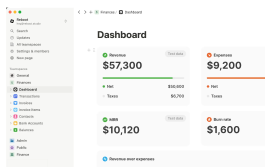Are you thinking of starting your own business but unsure where to begin? Should you open a general retail store with a broad product range, or a specialized cell phone shop for tech enthusiasts? While both seem similar at first glance, the differences are greater than you might think.
The retail industry continues to grow, with U.S. retail sales rising 3.9% in 2024, driven by consumer demand in various sectors — including technology. Meanwhile, the smartphone market remains a powerhouse, generating nearly $65 billion in U.S. sales in 2024.
With strong demand in both industries, deciding which path to take depends on factors like store size, profit margins, and daily operations.
To help you make the right choice, let’s break down three key pros and cons of each business type so you can decide whether a cell phone store or a retail store is a better fit for you.
What It’s Like Running a Cell Phone Store
A cell phone store’s primary goal is to sell new and used smartphones while providing customers with expert guidance and trustworthy service.
You’ll have to track sales, train your team, and make sure they can explain the technology and features in each phone to the customers. Many cell phone stores specialize or diversify their services to stand out. For instance, you could:
-
Sell both new and used phones to cater to different budgets
-
Offer repair and maintenance services to bring in repeat customers
-
Partner with carriers to sell devices and phone plans at competitive rates
-
Buy back used devices, refurbish, and resell them, creating an additional revenue stream
With the right strategy, your store can go beyond simple sales and become a go-to destination for tech-savvy shoppers, budget-conscious buyers, and customers looking for expert advice.
Pros and Cons of Running a Cell Phone Store
Do you love technology and follow the latest cell phone trends? Owning a cell phone store lets you turn that passion into a thriving business. Before taking the next step, here are the key pros and cons to consider.
Pros
- Lower initial costs: Stocking a cell phone store costs less upfront than starting a convenience store or most other general retail businesses. For as little as $20,000, you can purchase a complete starter inventory of latest-generation devices, screen protectors, accessories, and related products.
Cell phone inventory is also easy to store — no bulky shelving, special containers, or excess space required.
- Higher potential profit margins: With the right strategy and a good mix of products and services, you can generate better profit margins with a cell phone store vs. a retail store.
In addition to selling phones, revenue streams like accessories, repairs, extended warranties, and carrier partnerships can increase your profits.
- Fast turnover and steady demand: Unlike some traditional retail store products like holiday candy, sun protection, or snow shovels, cell phones and repair services are in demand all year. With fewer product categories to manage and no seasonal fluctuations, you can focus on selling the latest models — especially since new devices are released year-round.
Cons
-
Quickly outdated devices: With new cell phone and smartphone models launching frequently, last-generation devices can become outdated faster than expected. To stay ahead, you’ll need to sell inventory quickly and balance supply with demand, making sure you don’t overorder and get stuck with unsellable stock.
-
Carrier contracts may vary: If you partner with a carrier to offer plans and devices, you must meet their terms and conditions. Since each carrier operates differently, managing multiple contracts can become complicated.
-
Highly competitive sector: Anywhere there’s a market for cell phones, you’ll likely have plenty of competition. One of the biggest challenges, especially if you’re just starting out, is finding a unique edge or advantage that makes your business stand out from other cell phone stores.
If you’re planning to launch a cell phone store, a thorough business plan will set you up for success. It serves as your roadmap, helping you stay on track with your store’s mission and objectives in everything you do — from the big-picture strategy to daily operations.
What Running a Retail Store Is Like
Running a traditional retail store involves many of the same responsibilities — managing inventory, training staff, and creating an enjoyable customer experience. However, retail is an ever-evolving industry; not all stores are the same.
Whether you’re running a corner shop or a mega-chain, every retail model has its challenges and benefits. Unlike a cell phone store with a narrow product focus, general retail covers everything from daily essentials to big-ticket items, meaning success depends on strategy, efficiency, and knowing your customers.
Here’s a breakdown of a few major types of general retail stores.
-
Convenience store: Small, fast, and always within reach, convenience stores thrive on impulse buys and last-minute essentials. Stocking everything from snacks and drinks to toiletries and grab-and-go meals, these stores bank on high foot traffic and extended hours — sometimes 24/7 — to keep profits rolling in.
-
Grocery store: Grocery stores are a community staple. They move everything from fresh produce and frozen goods to household essentials and pantry staples. With perishables in the mix, inventory turnover is high, and owners need to manage supply chains efficiently.
-
Discount store: Stores like Walmart, Dollar General, or Aldi win over budget-conscious shoppers with rock-bottom prices. They make up for slim profit margins by selling high volumes of groceries, home goods, and everyday essentials, often sourcing products at steep discounts to pass savings along to customers.
-
Big-box retail: If convenience stores are the corner shops, big-box retailers are the shopping supercenters. These massive stores carry everything from groceries and clothing to furniture and electronics. Running a big-box store means managing huge inventories, massive real estate, and a workforce ranging from cashiers to logistics experts.
Success in retail means adapting to industry-specific demands. Unlike cell phone stores with a more defined focus, retail businesses vary widely, meaning there’s no one-size-fits-all strategy that works across the board.
Pros and Cons of Running a Retail Store
In general retail, store owners must manage everything from supplier negotiations and employee management to unpredictable customer demand while staying ahead of trends and competition. But the rewards can be big for those who get it right.
Here’s a look at the highs and lows of running a retail store.
Pros
-
Easier to customize the store experience: Retail stores provide countless opportunities to craft a distinctive brand identity — through strategic layouts, eye-catching product displays, and immersive shopping experiences that leave a lasting impression on customers.
-
More flexibility in promotions: Seasonal trends and shopping habits may fluctuate, but that also means plenty of chances to adjust inventory, launch themed sales, and keep customers engaged with fresh deals.
-
Can serve a more diverse audience: A retail store’s broad product selection draws in an eclectic mix of shoppers, unlike niche businesses like cell phone stores that cater to a specific market. More variety means more potential customers.
Cons
-
High fixed costs: Running a retail store isn’t cheap. From rent and utilities to constant restocking, the upfront investment and ongoing expenses can add up quickly — often outpacing the costs of a specialized cell phone shop.
-
More complex inventory management needs: A wide product selection means more to track, restock, and organize. Managing inventory across multiple categories takes time, precision, and the right systems to avoid stockouts or overstocking.
-
Staffing challenges: With so many products on the shelves, employees need continuous training to handle different departments, answer customer questions, and keep the store working. Finding and keeping knowledgeable staff can be a challenge.
These obstacles can make launching a retail store more demanding than opening a cell phone shop, requiring more planning, investment, and adaptability.
Cell Phone Store vs. Retail Store? Which Is Right for You?
Choosing between a cell phone store vs. a retail store means weighing the benefits and drawbacks of each. If you’re opening a cell phone store, you need more than just a generic point of sale (POS) system — you need one built for the unique demands of your industry, from managing repairs to handling bill payments.
CellSmart POS was designed specifically for cell phone stores to keep operations tight and sales flowing. Schedule a demo today to learn how CellSmart POS can help you achieve your small business goals.



